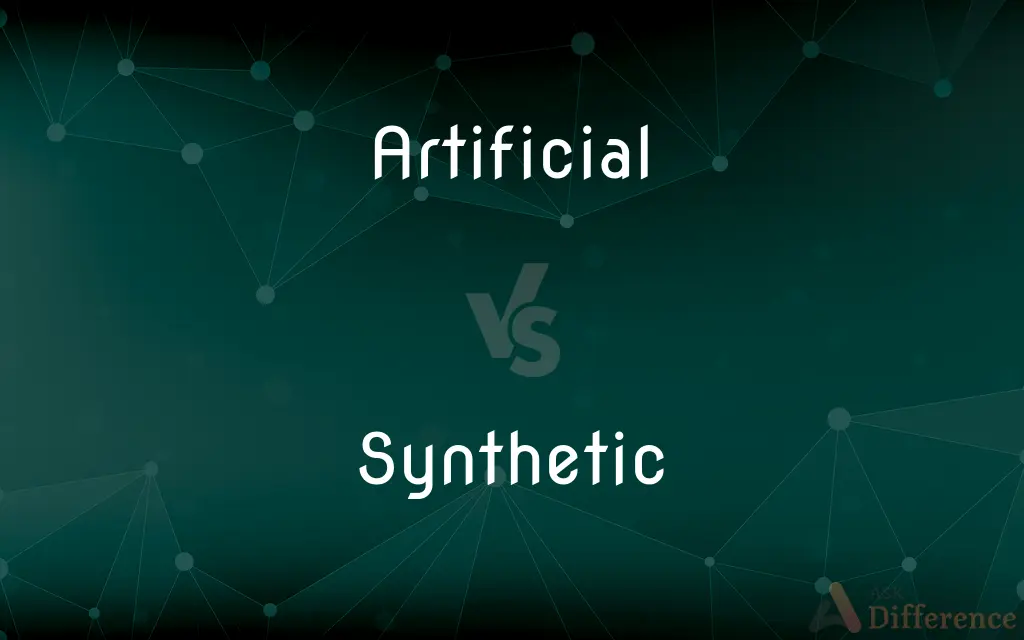Artificial vs. Synthetic — What's the Difference?
By Tayyaba Rehman & Fiza Rafique — Updated on March 9, 2024
Artificial implies man-made imitation of natural aspects, often lacking authenticity, whereas synthetic refers to substances chemically engineered to mimic or enhance natural properties.

Difference Between Artificial and Synthetic
Table of Contents
ADVERTISEMENT
Key Differences
Artificial products are designed to imitate or replace natural ones, often emphasizing cost-effectiveness and accessibility. On the other hand, synthetic materials are specifically created through chemical processes to possess certain desired properties, focusing more on improving functionality rather than merely copying.
While artificial flavors aim to replicate the taste of natural ingredients, synthetic compounds may enhance or modify these flavors, providing a more durable and intense taste experience. Whereas artificial items might lack the complexity of their natural counterparts, synthetics are engineered to meet or exceed natural specifications.
Artificial intelligence simulates human intelligence in machines, focusing on mimicking cognitive functions. Conversely, synthetic biology involves redesigning organisms for specific purposes, showcasing the depth of human ingenuity in creating new life forms or functions beyond mere imitation.
Artificial landscapes, such as theme parks, recreate natural or historical settings for entertainment, often sacrificing authenticity for appeal. In contrast, synthetic materials in landscaping, like artificial turf, are developed to offer practical benefits such as durability and low maintenance, transcending mere aesthetic mimicry.
Artificial and synthetic approaches both aim to surpass natural limitations, but their methods and goals diverge significantly. While artificial often denotes a superficial imitation, synthetic signifies a deeper, chemical creation process designed to improve or innovate beyond nature’s original blueprint.
ADVERTISEMENT
Comparison Chart
Definition
Made by human skill; imitation of natural items
Created through chemical synthesis
Focus
Imitation or replacement
Enhancement or creation of properties
Common Uses
Flavors, intelligence, landscapes
Materials, compounds, biology
Authenticity
Often lacks complexity of the original
Can exceed natural properties
Purpose
Cost-effectiveness, accessibility
Functionality, innovation, durability
Compare with Definitions
Artificial
Pertaining to environments or landscapes created by people.
They visited an artificial rainforest inside the biodome.
Synthetic
Produced by chemical synthesis, especially to imitate a natural product.
Synthetic rubber was crucial during World War II.
Artificial
Used in technology to mimic human behavior.
Artificial intelligence can automate complex tasks.
Synthetic
Pertaining to products created in laboratories.
The jacket is lined with synthetic insulation for warmth.
Artificial
Designed to imitate something natural.
Artificial sweeteners taste similar to sugar but without the calories.
Synthetic
Relating to substances made through chemical process.
Synthetic fibers are used widely in clothing for durability.
Artificial
Created by humans, not occurring naturally.
The park features an artificial lake.
Synthetic
Used in biology to refer to artificially produced genes or organisms.
Synthetic biology aims to redesign natural organisms.
Artificial
Relating to materials made by humans.
The artificial silk dress is surprisingly soft.
Synthetic
Involving the artificial assembly of complex materials.
Synthetic diamonds are now almost indistinguishable from natural ones.
Artificial
Made or produced by human beings rather than occurring naturally, especially as a copy of something natural
An artificial limb
Artificial flowers
Her skin glowed in the artificial light
Synthetic
(of a substance) made by chemical synthesis, especially to imitate a natural product
Synthetic rubber
Artificial
(of a person or their behaviour) insincere or affected
She gave an artificial smile
Synthetic
(of a proposition) having truth or falsity determinable by recourse to experience.
Artificial
(of a bid) conventional as opposed to natural
The Italian team began with an artificial club
Synthetic
(of a language) characterized by the use of inflections rather than word order to express grammatical structure.
Artificial
Made by humans, especially in imitation of something natural
An artificial sweetener that replaces sugar.
Artificial flowers.
Synthetic
A synthetic material or chemical, especially a textile fibre.
Artificial
Not arising from natural or necessary causes; contrived or arbitrary
"Hausa [in Niger] ... are separated from their brethren in Nigeria by a porous and artificial border that the colonial powers left behind" (Jeffrey Tayler).
Synthetic
Relating to, involving, or of the nature of synthesis.
Artificial
Affected or insincere
An artificial smile.
Synthetic
(Chemistry) Produced by synthesis, especially not of natural origin.
Artificial
Man-made; made by humans; of artifice.
The flowers were artificial, and he thought them rather tacky.
Synthetic
Prepared or made artificially
Synthetic leather.
Artificial
; fake, forced, or feigned.
Her manner was somewhat artificial.
Synthetic
Not natural or genuine; artificial or contrived
“counterfeit rhetoric that flourishes when passions are synthetic” (George F. Will).
Artificial
Not natural or normal: imposed arbitrarily or without regard to the specifics or normal circumstances of a person, a situation, etc.
Synthetic
(Linguistics) Relating to or being a language, such as Latin or Russian, that uses inflectional affixes to express syntactic relationships.
Artificial
(bridge) Conveying some meaning other than the actual contents of one's hand.
Synthetic
Logic & Philosophy Relating to or being a proposition that attributes to a subject a predicate not inherent in the subject, not following necessarily from logically true statements.
Artificial
Made or contrived by art; produced or modified by human skill and labor, in opposition to natural; as, artificial heat or light, gems, salts, minerals, fountains, flowers.
Artificial strifeLives in these touches, livelier than life.
Synthetic
Of or relating to a financial instrument or investment that consists entirely of derivatives, especially swap contracts.
Artificial
Feigned; fictitious; assumed; affected; not genuine.
Synthetic
A synthetic chemical compound or material.
Artificial
Artful; cunning; crafty.
Synthetic
Of, or relating to synthesis.
Artificial
Cultivated; not indigenous; not of spontaneous growth; as, artificial grasses.
Synthetic
(chemistry) Produced by synthesis instead of being isolated from a natural source (but may be identical to a product so obtained).
Artificial
Contrived by art rather than nature;
Artificial flowers
Artificial flavoring
An artificial diamond
Artificial fibers
Artificial sweeteners
Synthetic
(medicine) Produced by synthesis, thought to have the same effect as its natural counterpart, but chemically different from it.
Artificial
Artificially formal;
That artificial humility that her husband hated
Contrived coyness
A stilted letter of acknowledgment
When people try to correct their speech they develop a stilted pronunciation
Synthetic
Artificial, not genuine.
Artificial
Not arising from natural growth or characterized by vital processes
Synthetic
(grammar) Pertaining to the joining of bound morphemes in a word (compare analytic).
Synthetic
(linguistics) Of a language, having a grammar principally dependent on the use of bound morphemes to indicate syntactic relationships (compare analytic).
Synthetic
A synthetic compound.
Synthetic
Of or pertaining to synthesis; consisting in synthesis or composition; as, the synthetic method of reasoning, as opposed to analytical.
Philosophers hasten too much from the analytic to the synthetic method; that is, they draw general conclusions from too small a number of particular observations and experiments.
Synthetic
Artificial. Cf. Synthesis, 2.
Synthetic
Comprising within itself structural or other characters which are usually found only in two or more diverse groups; - said of species, genera, and higher groups. See the Note under Comprehensive, 3.
Synthetic
A compound made artificially by chemical reactions
Synthetic
Not of natural origin; prepared or made artificially;
Man-made fibers
Synthetic leather
Synthetic
Involving or of the nature of synthesis (combining separate elements to form a coherent whole) as opposed to analysis;
Limnology is essentially a synthetic science composed of elements...that extend well beyond the limits of biology
Synthetic
Systematic combining of root and modifying elements into single words
Synthetic
Of a proposition whose truth value is determined by observation or facts;
`all men are arrogant' is a synthetic proposition
Synthetic
Artificial as if portrayed in a film;
A novel with flat celluloid characters
Synthetic
Not genuine or natural;
Counterfeit rhetoric that flourishes when passions are synthetic
Common Curiosities
What is the main difference between artificial and synthetic?
Artificial refers to something made or produced by humans to imitate or replace something natural, focusing on imitation, whereas synthetic relates to substances created through chemical processes, often with the aim of enhancement or innovation.
Is synthetic biology the same as artificial intelligence?
No, synthetic biology involves redesigning organisms for specific purposes through engineering, whereas artificial intelligence simulates human intelligence in machines.
Can artificial flavors be considered synthetic?
Yes, artificial flavors can be considered synthetic when they are chemically engineered to mimic natural tastes.
Why are artificial products created?
Artificial products are created for various reasons, including cost reduction, ease of production, and to provide alternatives to natural products that may be scarce or expensive.
How do artificial environments impact human psychology?
Artificial environments can impact human psychology in various ways, including providing a sense of escapism or relaxation, though they may also lead to feelings of artificiality or disconnection from nature.
Do synthetic products harm the environment more than artificial ones?
The environmental impact varies widely depending on the specific substances and their production processes. Both synthetic and artificial products can have negative environmental effects, but synthetics, due to their chemical nature, may pose unique challenges in terms of pollution and degradation.
What role do synthetic compounds play in medicine?
Synthetic compounds play a crucial role in medicine by providing drugs that mimic natural substances or create new treatments that are not found in nature.
Are synthetic materials always artificial?
Yes, synthetic materials are a subset of artificial materials, specifically those made through chemical synthesis.
Is it possible to have a product that is both artificial and synthetic?
Yes, many products are both artificial and synthetic, especially those that are human-made to imitate natural products through chemical processes.
What are the benefits of synthetic materials over natural ones?
Synthetic materials often offer enhanced properties such as durability, strength, and resistance to environmental factors, which can be beneficial in many applications.
Can artificial intelligence develop synthetic biology solutions?
Yes, artificial intelligence can aid in the development of synthetic biology solutions by analyzing data and designing new organisms or genetic modifications more efficiently.
How are synthetic materials created?
Synthetic materials are created through chemical synthesis, which involves combining different substances to form a new material with specific properties.
Are all synthetic products safe for human use?
Not all synthetic products are inherently safe for human use; their safety depends on their chemical composition, usage, and regulatory approval.
Are artificial sweeteners synthetic?
Yes, artificial sweeteners are synthetic because they are created through chemical processes to mimic the sweetness of sugar without its caloric content.
What advancements have been made in synthetic materials technology?
Advancements in synthetic materials technology include the development of biodegradable plastics, high-performance fibers for industrial and medical use, and synthetic biological systems for environmental remediation.
Share Your Discovery

Previous Comparison
Payee vs. Payer
Next Comparison
Lower vs. LowestAuthor Spotlight
Written by
Tayyaba RehmanTayyaba Rehman is a distinguished writer, currently serving as a primary contributor to askdifference.com. As a researcher in semantics and etymology, Tayyaba's passion for the complexity of languages and their distinctions has found a perfect home on the platform. Tayyaba delves into the intricacies of language, distinguishing between commonly confused words and phrases, thereby providing clarity for readers worldwide.
Co-written by
Fiza RafiqueFiza Rafique is a skilled content writer at AskDifference.com, where she meticulously refines and enhances written pieces. Drawing from her vast editorial expertise, Fiza ensures clarity, accuracy, and precision in every article. Passionate about language, she continually seeks to elevate the quality of content for readers worldwide.
















































